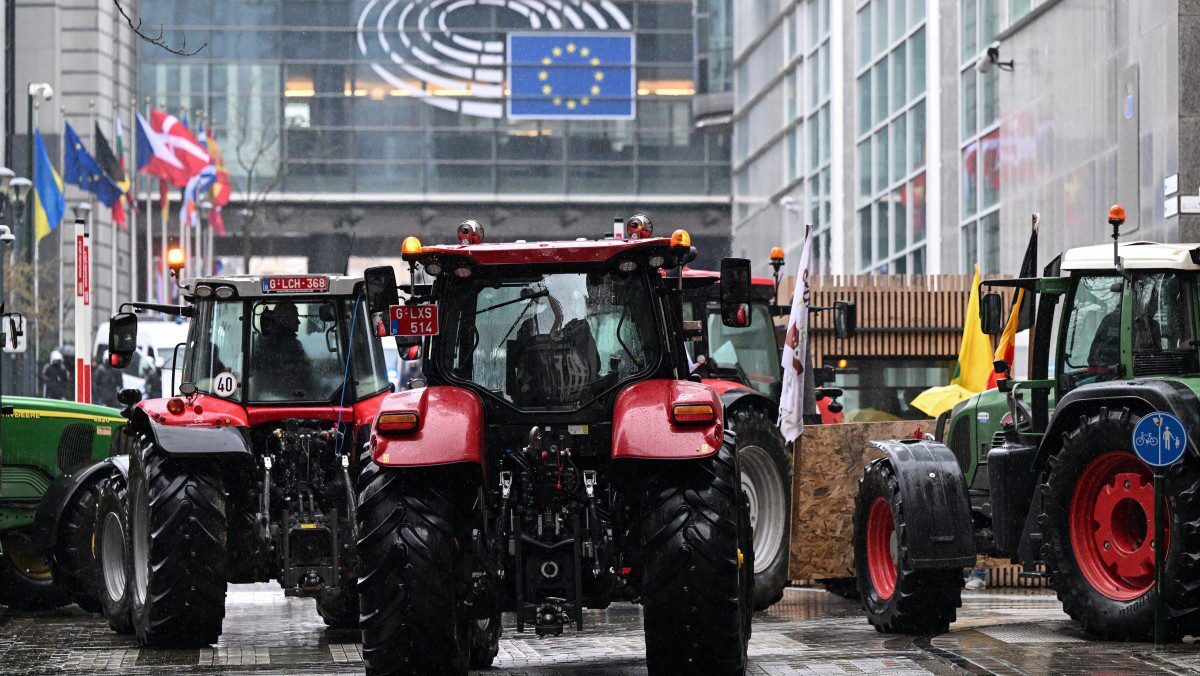
Tractors parked in downtown Brussels during the farmers’ protests.
Photo: John Thys / AFP
European farmers’ protests have led to some changes on the national level in most countries, but the primary demands of protesters concern EU policies that still need to be addressed by Brussels.
According to a map published by Euractiv, visualizing farmers’ protests across the continent, recent farmers’ protests broke out in 22 out of the 27 EU member states, with only Denmark, Sweden, Finland, Estonia, and Austria managing to stay clear of the pan-European protest movement so far.
Within these 22 countries where farmers took to the streets, 15 governments have already granted certain national concessions to the agricultural sector, primarily in the form of tax cuts and subsidies for fuel and fertilizer, with some livestock and grain farmers also given one-time financial aid packages to reimburse them for lost profit due to the COVID-crisis and cheap Ukrainian imports.
Additionally, farmers’ unions are still negotiating further concessions with several governments across the bloc. The only countries where protests have not led to any changes yet are the Netherlands, Luxembourg, Ireland, Slovakia, Hungary, Croatia, and Malta.
Germany, France, and Spain, for instance, all extended the availability of their agricultural fuel subsidies, among others, while Bulgaria, Romania, and Czechia gave direct financial support to their struggling farmers. No country has changed the rules on Ukrainian imports but Latvia at least banned Russian agricultural products within its borders.
Interesting map from @Euractiv showing the success of #farmerprotests as most countries already granted concessions, like tax cuts and subsidies. But remember that the main problems still need to be addressed by the EU: the #GreenDeal and trade liberalization w/ Ukraine. pic.twitter.com/EmV7ZtwRCl
— Tamás Orbán (@TamasOrbanEC) March 4, 2024
Nonetheless, the map also reveals that the main concerns of protesters throughout Europe still haven’t been addressed, as they have to do with EU politics, specifically.
The three most common demands include the rolling back or softening of the environmental requirements of the EU’s Common Agricultural Policy (CAP). Farmers need to adhere to these if they want to access EU financial support. Europe’s farmers also want to see the end of unfair trade deals with third parties that drive down prices (such as the Mercosur deal with Latin American countries). They also want to stop the cheap Ukrainian imports made possible by the EU’s special deals with Kyiv after the Russian invasion.
The flood of cheap Ukrainian produce was initially criticized by Central and Eastern European member states in particular (Poland, Romania, Slovakia, Hungary, and Bulgaria), but it has become an important talking point in countries further away from the Ukrainian border too, such as the Czech Republic and France.
Since these issues cannot be successfully tackled on the national level, it’s up to the European Union to listen. The capitals also know this and are placing increasing pressure on Brussels to act.
Last week, EU agricultural ministers jointly called on the Commission to complete its proposed reforms and initiate “more ambitious ones” during a second round of major protests on the streets of Brussels that saw tractors removing police cordons and spraying officers with manure.
The EU Commission has so far replied with mostly symbolic concessions and by launching a “strategic dialogue” on the future of EU agriculture, promising concrete reform proposals by mid-March. There’s no guarantee that any major reforms can be implemented in time as there are only three months left until the next EU elections.
